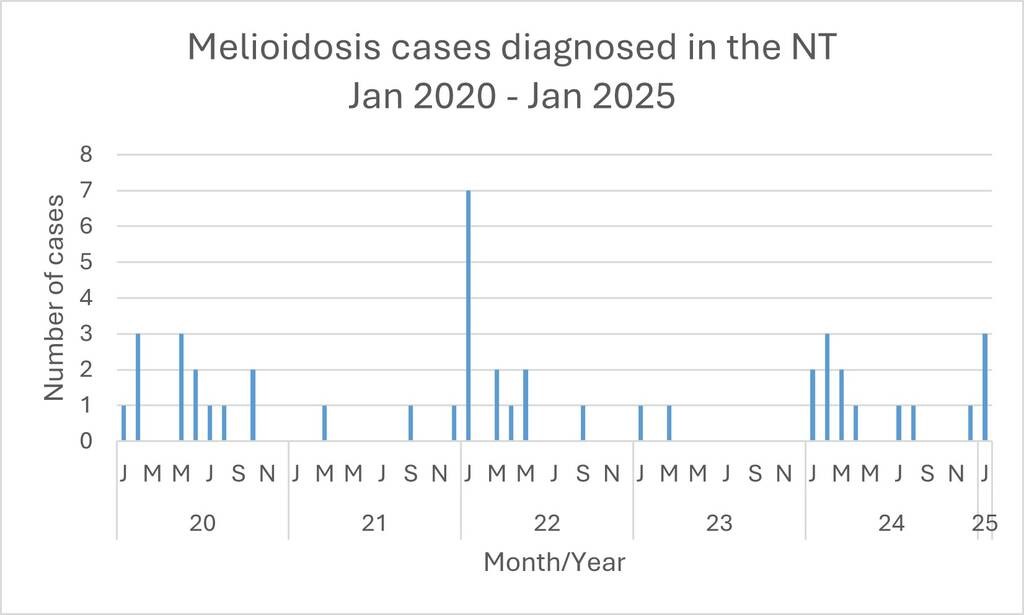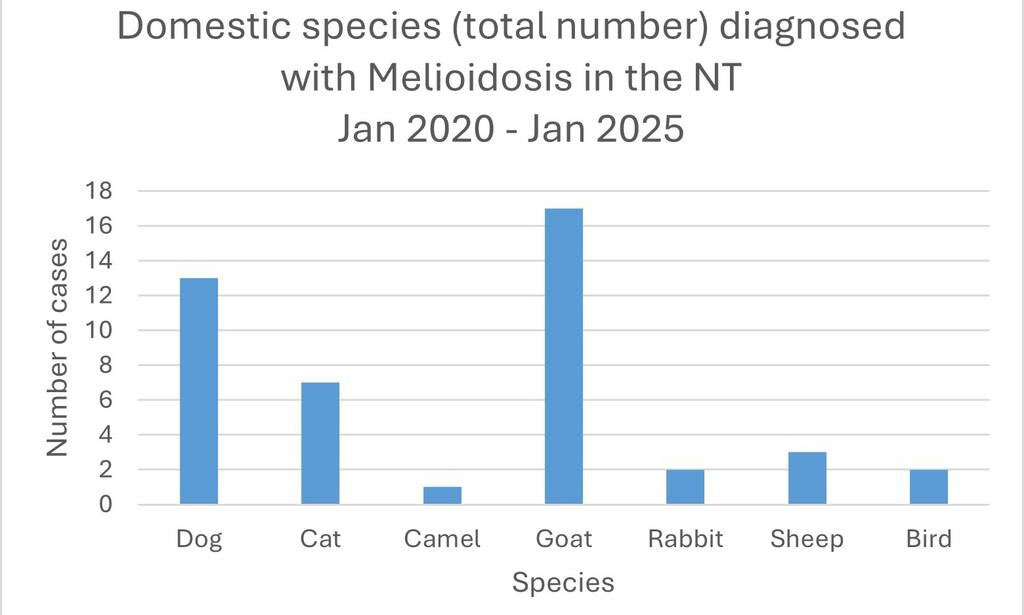Vet News NT: March 2025
Message from Chief Veterinary Officer Rob Williams
Hello to all subscribers!
I would like to extend my belated greetings for the holiday season and wish you all a Happy New Year. 2025 promises to be another busy year and that is just as relevant for the Veterinary Surgeon’s Board (VSB). I would like to welcome Dr Lil Stedman and Dr Lauren Walters to the Board and look forward to working with them to progress VSB priorities, the number one being protection of the veterinary professions’ reputation.
I would like to acknowledge the great work done by Dr Vidya Bhardwaj as the President of the VSB over the last two years and Dr Ian Gurry for the past 13 years. Unfortunately, Dr Bhardwaj has left the Northern Territory (NT), but it is comforting to know she is now working at ACDP in Geelong. I have resumed my duties as the President of the VSB, as the Chief Veterinary Officer (CVO) is required to do under the Veterinary Act.
More broadly in the Livestock Biosecurity area my priorities as CVO for 2025 are disease investigations (in the context of Emergency Animal Disease surveillance), regulatory reform for some of our key activities such as tick inspection, and modernisation of our systems and technology platforms. I look forward to working with you all in 2025!
A message from the Registrar
Registration renewals have been completed and I am pleased to say there are 144 Registered Vets in the NT, including 14 new registrations.
Please remember to email vetboard@nt.gov.au if your details change throughout the year.
Navigating emotions in clients
Receiving difficult news about a pet, such as a serious diagnosis or the need to consider euthanasia, can be emotionally overwhelming for clients.
Recent cases before the Board have highlighted how a veterinarian's approach during these moments can shape a client’s view of the veterinarian’s competence and empathy. While the veterinarian often followed recommended practices in presenting options, a client’s heightened emotional state affected his or her interpretation of the interaction, leading to Board complaints.
Trauma can cloud judgment. Where possible, slow down conversations, offer a written summary of the discussion, including options, and allow time for decisions.
In cases of euthanasia, respecting the client’s preferences and offering aftercare resources can provide comfort in a difficult moment.
As always, ensuring informed consent and documenting conversations, recommendations, advice, and decisions surrounding treatment are essential.
Northern Australia Biosecurity Network (NABSnet)
The NABSnet Program is an established pathway for connecting a network of over 100 veterinarians working together towards the enhancement of biosecurity in Northern Australia.
Addressing the gap in animal health surveillance strategy, NABSnet offers a wide network of supporting activities, including building and refreshing technical resources in areas such as postmortems, significant disease investigations, case discussions, pathology challenges and disease information.
NABSnet’s objective is to strengthen connections between pastoralist, private vets and government field and laboratory vets for improved information sharing and stronger biosecurity. With the aim of increasing exotic disease surveillance, NABSnet is a supportive biosecurity network for all veterinarians.
For more information, please contact Dr Jane Giliam, Senior Veterinary Officer on (08) 8999 2335.


Engaging Private Veterinarians in an Emergency Animal Disease Response
Private vets have an important role to play in emergency animal disease responses in Australia.
Private veterinarians will play a critical role in responding to emergency animal disease (EAD) outbreaks. The Northern Territory will need "all-hands-on-deck" for a timely, efficient and effective response to a large EAD incursion, such as foot-and-mouth disease, lumpy skin disease or avian influenza.
In the event of an EAD incursion, the Department of Agriculture and Fisheries (DAF) Livestock Biosecurity Branch will be responsible for the control and eradication of the disease including decisions around control strategies, surveillance, detection, and any necessary destruction and disposal of livestock.
As part of our planning, it is crucial Livestock Biosecurity can call upon the assistance of private veterinarians from across the Territory to ensure the best possible outcome for affected livestock, farming communities and the agriculture industry.
Private veterinarians would be sought to assist with providing a range of field-based services, including investigating suspect cases, conducting field surveillance and collecting diagnostic samples.
All veterinarians are encouraged to consider their potential role in the event of an EAD and stay up to date on the latest news and developments in this important space. To express your interest in supporting EAD responses, register your interest online at Veterinary Board of the Northern Territory | Department of Agriculture and Fisheries
Private veterinary involvement in an EAD outbreak will be vital to protecting Australia’s animals and animal industries. For more information visitEngaging Private Veterinarians in an Emergency Animal Disease Response.
You can prepare by undertaking Animal Health Australia Online training courses at
animalhealthaustralia.com.au/online-training-courses
Of particular relevance to veterinarians:
- ASF prevention and early detection course
- ASF surveillance and sampling course
- Rabies awareness and early detection
- Australian Government Accredited Veterinarian
- FMD training for veterinarians and veterinary paraprofessionals
- National Transmissible Spongiform Encephalopathies Surveillance Project training guide
Reminder Notice - Elisa serology
Berrimah Veterinary Laboratory (BVL) reminds you that until further notice, ELISA serology to detect antibodies to Ehrlichia canis will no longer be offered at BVL as the ELISA kit has been discontinued by the supplier.
BVL is currently considering whether to seek other ELISA testing options to continue this testing. Other serological tests to detect antibodies to Ehrlichia canis are the Idexx snap test (available for clinics to purchase as an in-clinic dog-side test) and the IFA (immunofluorescent assay) test offered by some interstate referral laboratories (test cost is relatively expensive, likely at least $300, please contact referral laboratory for specifics).
BVL does still perform molecular testing to detect the Ehrlichia canis agent in whole anticoagulated blood (as one of the three agents detected by our canine tick fever multiplex PCR, along with Babesia canis vogeli and Anaplasma platys). The test fees remain the same: Accession charge of $19.87, tick fever multiplex PCR (Ehrlichia canis, Babesia canis vogeli and Anaplasma platys) $115.36.
To contact Berrimah Veterinary Laboratory phone 08 8999 2249 or email bvl@nt.gov.au
Other News
To evaluate programs designed to attract, recruit and retain veterinary professionals - Churchill Trust
An Essential Ingredient: The Food Supply Chain Workforce | Jobs and Skills Australia
Refer others to this newsletter by sending them our subscription link.
Contact us
Veterinary Board registrar
Phone: 08 8999 2028
Fax: 08 8999 2089
First floor John England Building
Berrimah Farm
Makagon Road
Berrimah NT 0828
GPO Box 3000
Darwin NT 0801
Give feedback about this page.
Share this page:
URL copied!